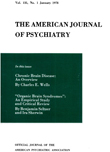Social skills training compared with pharmacotherapy and psychotherapy in the treatment of unipolar depression
Abstract
The authors contrasted four treatments for unipolar (nonpsychotic) depression: 1) amitriptyline, 2) social skills training plus amitriptyline, 3) social skills training plus placebo, and 4) psychotherapy plus placebo. They studied 72 female outpatients, 52 of whom completed the 12 weeks of treatment. The four treatments, conducted by experienced clinicians, were not substantially different from one another. Each treatment produced significant and clinically meaningful changes in symptomatology and social functioning. However, the authors identified several notable differences across groups: a significant difference in dropout rates (from a high of 55.6% for the amitriptyline group to a low of 15% for the social skills plus placebo group) and a significant difference in the proportion of patients who were substantially improved. The social skills plus placebo treatment was the most effective treatment on this dimension.
Access content
To read the fulltext, please use one of the options below to sign in or purchase access.- Personal login
- Institutional Login
- Sign in via OpenAthens
- Register for access
-
Please login/register if you wish to pair your device and check access availability.
Not a subscriber?
PsychiatryOnline subscription options offer access to the DSM-5 library, books, journals, CME, and patient resources. This all-in-one virtual library provides psychiatrists and mental health professionals with key resources for diagnosis, treatment, research, and professional development.
Need more help? PsychiatryOnline Customer Service may be reached by emailing [email protected] or by calling 800-368-5777 (in the U.S.) or 703-907-7322 (outside the U.S.).



